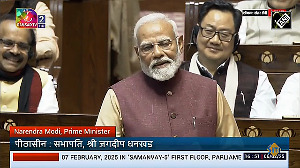Intending to mediate between New Delhi and Islamabad, China's rising international image would be tested once again in the aftermath of the Mumbai attacks, although indicators so far point towards a Cold War posture from Beijing. Possibly another missed chance in the making for the two Asian giants in restructuring and reordering regional security architectures!
The pronouncements and actions of several Chinese officials and the military in the recent period indicate that direction. China's policy towards this region -- against the backdrop of the Mumbai attacks -- is pitched at three inter-related objectives: Protect China's north-western region from Uighur extremists; prepare militarily for any eventuality in the current South Asian imbroglio; and evolve diplomatic postures to retain China's influence in Pakistan and South Asia.
Towards achieving these objectives, China had in the recent period initiated several measures, although tensions emerged in these policy formulations. Specifically, if all forms of terrorism are to be condemned in the post 9/11 global consensus, then cross-border terrorism (a catch phrase for the late Zia-ul Haq's Operation Topaz that visualised cutting India and thereby bleeding it by a thousand cuts) also should not be given space. Yet, China's response on this aspect is either mute or nuanced, while New Delhi agreed to the Chinese formulation of opposing three evils.
In its dealings with Islamabad, Beijing is satisfied if the Pakistani military makes efforts to curb support to Uighur extremism in Xinjiang and efforts made to protect nearly 3,000 Chinese workers and engineers working in Pakistan. Towards these objectives, two strategic dialogues and six defence and security talks were conducted by 2008, two major counter-terrorism exercises were launched in the Taxkorgan and Abbotabad areas between these countries.
Other measures were also undertaken. China's assumption is that of the three main actors in the current imbroglio in Pakistan, the army and the civilian leadership could be roped in while the jihadi elements should be contained, specifically in their support to the Uighurs in Xinjiang.
Yet, the ground reality posed complications for China. In September last year, for instance, two Chinese engineers of the Zhongxing Telecommunication Equipment Company were kidnapped in the Lower Dir district of the North Western Frontier Agency. On the occasion China's foreign ministry spokesman Jiang Yu 'demanded Pakistan go all out to rescuing the two missing engineers and ensure their safety.'
In April last year, the Pakistan army handed over suspected terrorists involved in supporting Uighurs, while in October 2003, the Pakistani military went to the extent of killing East Turkestan Islamic Movement leader Hasan Mahsum to satisfy Beijing. General Pervez Musharraf's swift handling of the Red Mosque incident was also praised by Beijing.
In July 2005, four Chinese citizens were attacked in Peshawar. China's response at that time was to demand 'immediate investigation, bring the criminals to justice, properly treat the wounded and deal with the aftermath, and take concrete and effective measures to strengthen the protection over Chinese citizens in Pakistan.'
Against this backdrop, it needs to be seen if China supports recent Indian demand for repatriation of criminals or their investigation by Islamabad.
As a part of its second approach, after the Mumbai attacks, China reportedly mobilised two army divisions in the Lanzhou military region, contiguous to the Aksai Chin areas soon after India-Pakistan military movements started. (Although, it is officially not confirmed.) Possibly, this is to counter any fallout from the South Asian conflict, but presumably also to aid Pakistan in any eventuality. This is not surprising as the Chinese military did come to the rescue of Pakistan in the 1965, 1971 and 1999 wars.
The third approach includes diplomatic tight-rope walking between New Delhi and Islamabad. Foreign Minister Yang Jiechi, in an interview to the Associated Press of Pakistan in April 2008 praised that 'Pakistan has made tremendous efforts in recent years to promote international counter-terrorism cooperation.' This was against the backdrop of the handing over to China of suspected terrorists.
In the aftermath of the Mumbai attacks, on December 26, the Chinese foreign minister telephoned his Indian and Pakistani counterparts to reiterate 'China's strong condemnation of the attacks' but, more importantly, hoping that these South Asian countries 'bear in mind regional peace and stability.'
Again, He Yafei visited Islamabad last week with the mission of easing the tensions between India and Pakistan. He stressed, in his meetings with the powers-that-be in Pakistan that the 'consultation and cooperation' mechanism need to be evolved between Pakistan and India, while praising the Pakistan leadership's 'mature and restrained approach.' However, this Chinese position appears to be at variance when terrorist incidents took place in China.
All the above diplomatic efforts by China indicate dousing tensions between India and Pakistan, but the central issue -- counter-terrorism -- may take a back seat.






 © 2025
© 2025